Judge puts off ruling on Trump's request for special master to review docs from Mar-a-Lago
- Oops!Something went wrong.Please try again later.
A federal judge, who had signaled a willingness to appoint a special master to review documents seized last month from former President Donald Trump’s Mar-a-Lago estate, on Thursday declined to immediately do so.
After listening to nearly 90 minutes of often heated exchanges between Trump’s attorneys and federal prosecutors, U.S. District Judge Aileen Cannon said she would issue a written order “in due course.”
At the request of Trump’s attorneys and news media organizations, she agreed to release a detailed list of items taken on Aug. 8 when FBI agents searched Trump’s Palm Beach home, which is also a private club.
While insisting a previously-released barebones list was adequate, prosecutors said they had no objections to allowing Trump and the public to see a more detailed accounting of the roughly 30 boxes of classified and unclassified materials that were taken mainly from a storage room and Trump’s office. As of Thursday evening, that list remained sealed.
'Stickler for procedure': Federal judge now at center of Trump's Mar-a-Lago search
Justice Department opposes release: DOJ argues against release of probable cause affidavit behind FBI Trump search
Mar-a-Lago search: Documents released Friday reveal 184 classified documents taken
But, as they have done in court papers, prosecutors vigorously objected to Trump’s request to have a special master review the roughly 300 pages of classified materials that were found. Some contain highly-sensitive top secret information that deals with national security, prosecutors said.
Jay Bratt, chief of counterintelligence and export control for the Department of Justice, said an independent review has been done of the documents. Material that would violate Trump’s attorney-client privilege has not been shared with prosecutors and agents who are investigating Trump and others for possible violation of the espionage act and obstruction of justice.
The filter team, also known as a taint team, set aside 64 sets of material, comprising 520 pages of documents, that could violate Trump’s right to keep communications with his attorneys private, said Benjamin Hawk, who is Bratt’s chief deputy and is overseeing the review process.
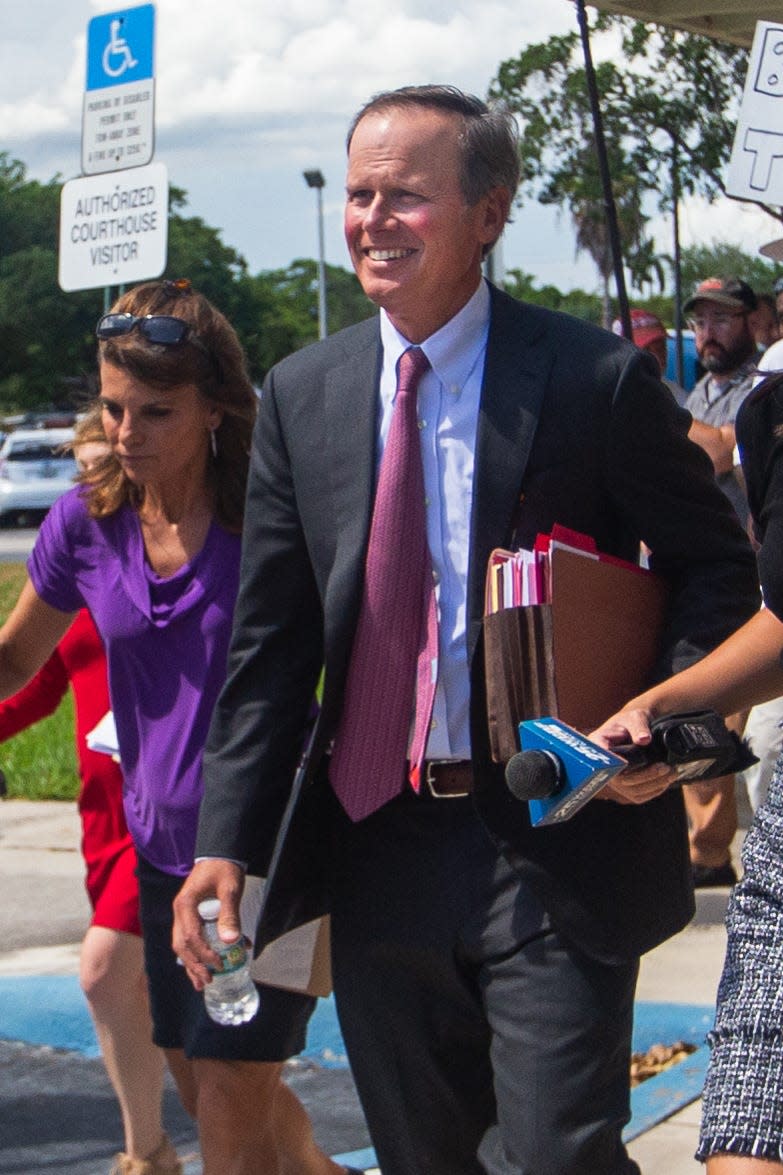
Those involved worked in a locked room that was accessible only to team members, he said. The team took a liberal view of what might constitute a legal document. If there was a lawyer’s name on it or written on a law firm’s letterhead, the record was segregated from documents turned over to those investigating the criminal case, Hawk said.
At the conclusion of the hearing, Hawk offered to share the documents with Trump’s attorneys so they would know what had been set aside and not shared with investigators.
Cannon rejected his offer, saying she wanted to consider it as she weighs whether to appoint a special master.
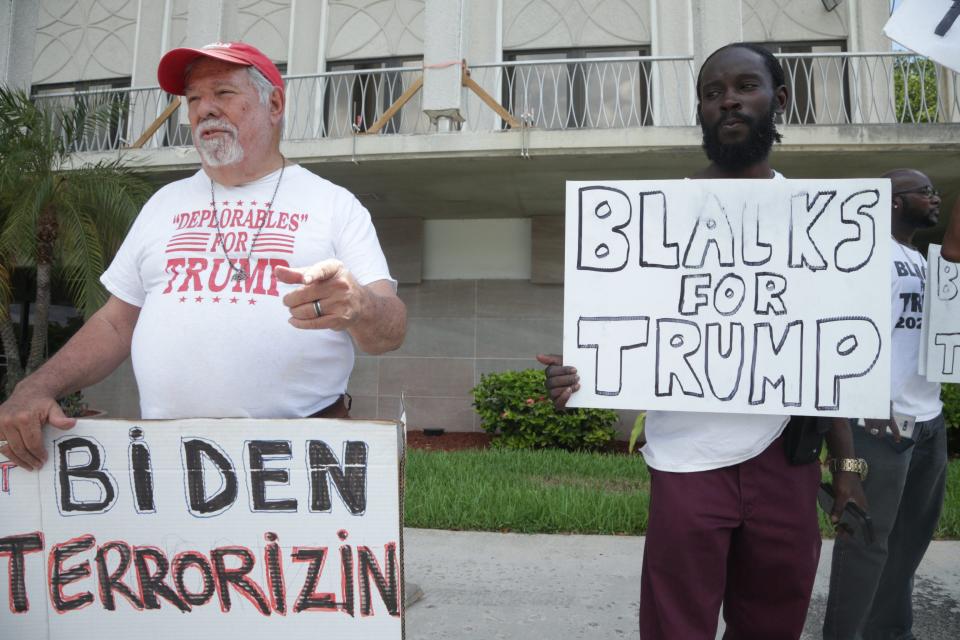
A small group of Trump supporters gathered outside the federal courthouse in downtown West Palm Beach. Five men said they traveled from Miami to support the former president.
One group wore T-shirts identifying themselves as “Blacks for Trump.” Bob Kunst, a longtime gay rights activist and one-time perennial political candidate, held a sign proclaiming, “Fascist Biden Terrorizing Trump and America.”
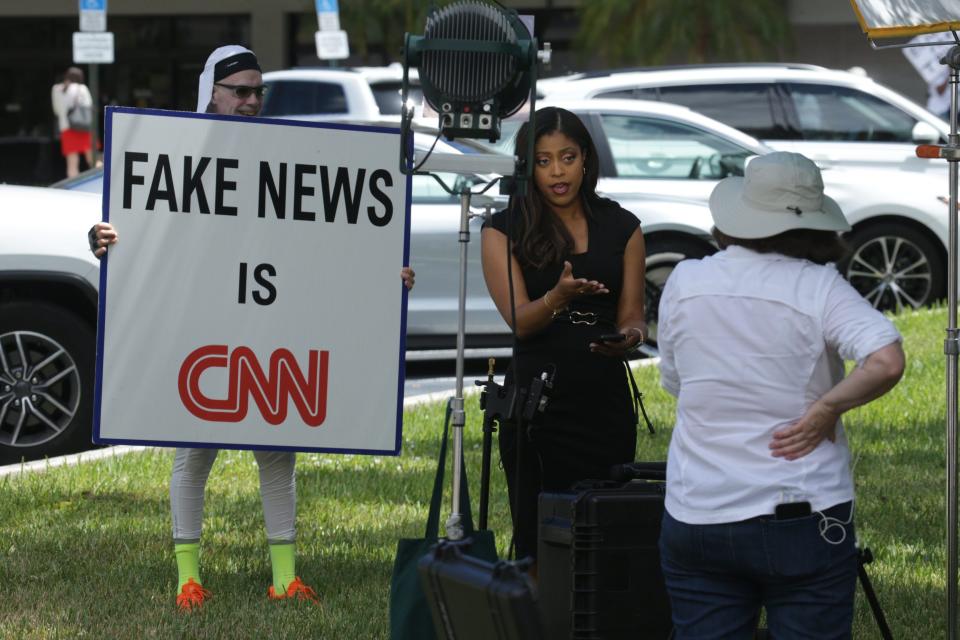
Inside, Trump’s attorneys attacked the Justice Department for objecting to what they described as “a modest request” to have an independent review of the seized documents.
Calling the search and investigation a “historic, outrageous and inequitable situation,” Trump attorney James Trusty pushed for the appointment.
A recently-hired Trump attorney, Christopher Kise, a former Florida solicitor general who served on Gov. Ron DeSantis’s transition team, said the appointment of a special master would go a long way to restoring public confidence in the justice system.
“You are in a challenging and unique position to restore order and public confidence in the judicial process,” Kise told Cannon, who was appointed to the bench by Trump in 2020.
“We need to lower the temperature. We need to take a deep breath,” he said. “This isn’t about some low-level military person stuffing documents in their pockets and sneaking out in the middle of the night,” he said.
The documents were stored at Mar-a-Lago, which was referred to as the Winter White House or Southern White House, because Trump often conducted official business there during Palm Beach's social season while he was president, Kise said.
While Trump’s attorneys said he had a right to keep the documents, Bratt disagreed.
“He is no longer president and because he is no longer the president he had no right to take these documents,” Bratt said. They belong to the U.S. government.
Further, the law is clear that classified documents, particularly those involving national security, have to be stored in a secure location.
Instead, Bratt said, the documents were intermingled with photos, personal correspondence, news clippings and magazines in the storage closet and Trump’s office.
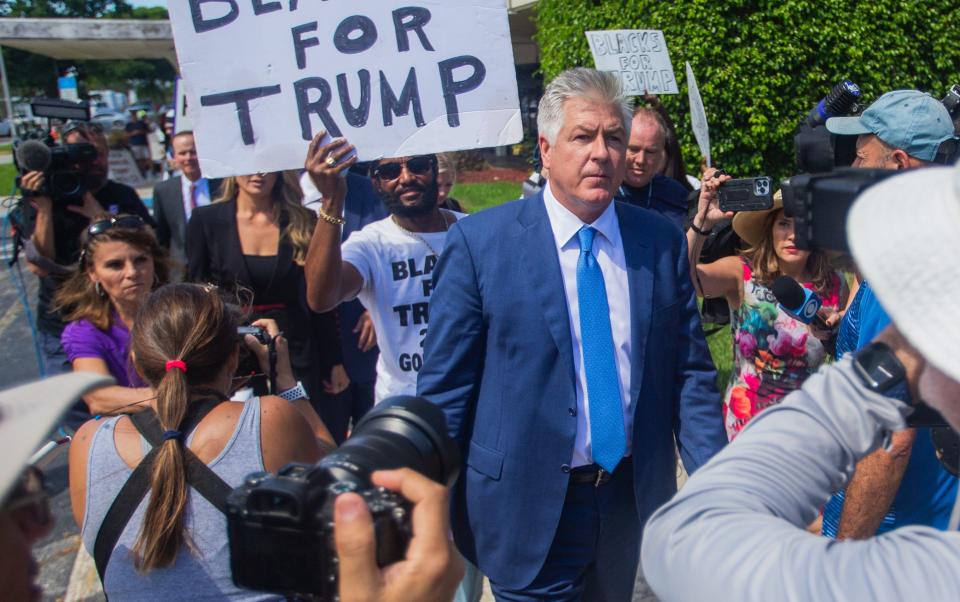
“They weren’t his. They weren’t properly stored,” Bratt said. “Are they potentially incriminating? Yes.”
Cannon quizzed the attorneys repeatedly. She asked Trump's attorneys whether they just wanted to protect the former president’s attorney-client privilege or whether he was claiming executive privilege as well.
While Kise said the main focus was on protected legal communication between Trump and his lawyers, he said “executive privilege may be in play as well.”
Cannon also quizzed prosecutors. As they argued against the appointment of a special master, Cannon interrupted. “What is the harm?” she asked.
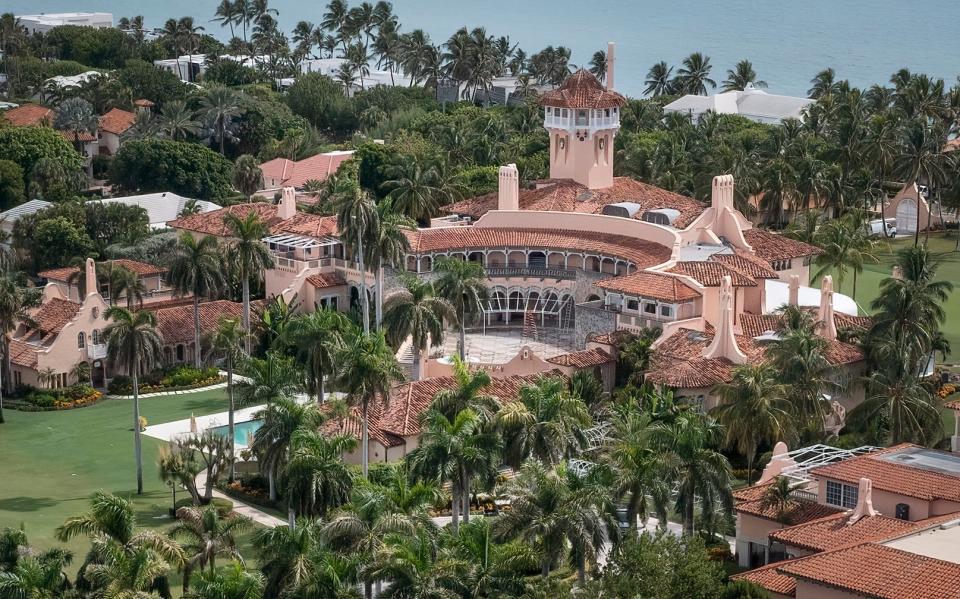
Bratt said it would unnecessarily delay the ongoing investigation. The Office of the Director of National Intelligence is already reviewing the documents to assess what damage might be caused if they were released.
Further, he said, a special master would have to get security clearance to look at the materials. That could take time.
Trusty, a former federal prosecutor who said he had gone through the security review process, said the necessary background checks could be done quickly. He scoffed at Bratt’s continuing efforts to block the appointment of an independent reviewer.
“It’s like chasing someone who is throwing trash cans at you to keep you from catching up,” he said.
Bratt and his legal team voiced equal disdain for arguments raised by Trump’s attorneys. Trump’s claims that his rights were violated by the search don’t hold up, Bratt said.
The search was authorized by U.S. Magistrate Judge Bruce Reinhart after he found there was probable cause serious crimes had been committed, Bratt said.
Further, to prove his rights were violated, Trump would have to show he had what in the legal world is known as “clean hands.”
“The former president was in possession of classified records,” Bratt said. “That’s a classic example (of unclean hands).”
But, Trusty insisted, the Justice Department is on a witch hunt. They are using Trump’s dispute with the National Archives and Records Administration to launch an unprecedented search of a former president’s home and then accuse him of violating the law.
“They are criminalizing the Presidential Records Act,” he said of the measure that was passed in 1978 in the wake of the downfall of President Richard Nixon to make it clear that executive branch records belong to the public.
He compared Trump’s possession of classified materials to failing to return an “overdue library book.”
Bratt disagreed with Trusty’s assessment. “This was not an end-run around the (Presidential Records Act),” he said.
In court papers filed before Thursday’s hearing, Bratt said Trump gave prosecutors no choice but to seek a warrant to enter Mar-a-Lago. Trump and his attorneys repeatedly ignored demands to turn over documents, Bratt said.
Search warrant: Read the FBI's search warrant for Donald Trump's Mar-a-Lago property
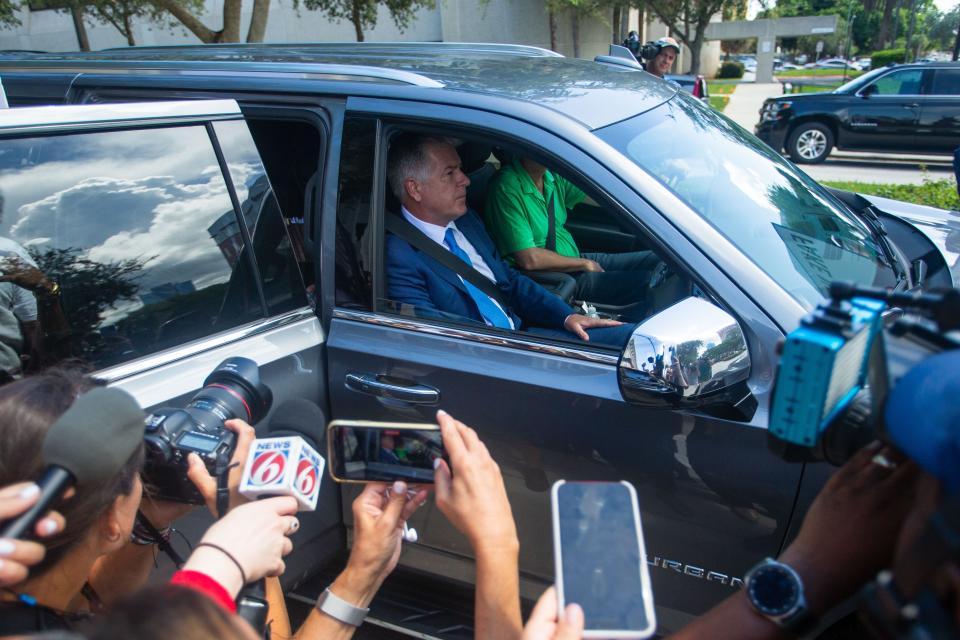
After a team from the National Archives retrieved 15 boxes of materials from the estate in January, it notified DOJ that they discovered more than 100 classified documents, comprising more than 700 pages. Of those 92 were labeled top secret.
An investigation revealed there were more classified documents at the estate, Bratt said. When Trump and his attorneys ignored requests to turn over additional classified materials, in May a grand jury subpoena was obtained, demanding their return.
Finally, during a meeting with DOJ officials in June, Trump’s attorneys turned over an envelope containing an additional 38 classified documents. They assured DOJ officials that they had conducted a “diligent search” and no more remained in the mansion.
Again, Bratt said, evidence showed that classified material remained at Mar-a-Lago. Prosecutors, with the permission of Attorney General Merrick Garland, took the unprecedented step of seeking a warrant to search the home of a former president.
“The FBI, in a matter of hours, recovered twice as many documents with classification markings as the ‘diligent search’ that the former President’s counsel and other representatives had weeks to perform,” Bratt said in court papers.
At the hearing, Bratt said Trump’s legal team should have pushed for the appointment of a special master immediately after the search. After he initially rejected their request, he said he didn’t hear back from them.
Instead, 12 days later, Trump filed suit. By then, the filter team had completed its work.
Trusty said he couldn’t explain the reasons for the delay without violating confidential conversations he had with Trump about legal strategy. But, he said, he was hoping the Justice Department would voluntarily agree to the independent review.
“We wanted to explore whether we could get some level of cooperation so we wouldn’t have to run to court,” he said.
But, he said, despite the delay, the request should be approved.
“The idea of stopping a runaway train for a little bit … with the appointment of a special master makes sense,” Trusty said.
Jane Musgrave covers federal and civil courts and occasionally ventures into criminal trials in state court. Contact her at jmusgrave@pbpost.com.
This article originally appeared on Palm Beach Post: Judge will issue written order "in due course" on Mar-a-Lago papers.

